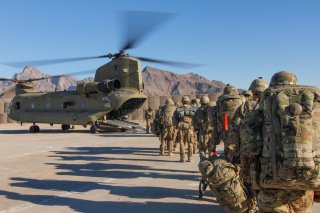How Afghanistan Impacts the Ukraine Crisis
The Biden administration is applying some of the lessons learned from the Afghanistan experience by taking a more proactive and inclusive approach towards the Ukraine crisis.
Ironically, instead of “splitting NATO” Putin’s actions have galvanized an alliance searching for relevance in the post-Afghanistan era. NATO secretary-general Jens Stoltenberg said that “if Russia wants less NATO at its borders, they have actually achieved exactly the opposite. And if they use force again against Ukraine, they will achieve even more NATO at their borders.”
The Biden administration is applying some of the lessons learned from the Afghanistan experience by taking a more proactive and inclusive approach towards the Ukraine crisis. The risk, of course, is the president’s zeal to re-establish U.S. credibility will manifest in bellicose words and actions that (unintentionally) elevate tensions with Russia and increase the possibility of a strategic miscalculation that leads to armed conflict.
To mitigate this risk, the Biden administration and its allies seem willing to provide Russia with an ‘“off-ramp” by offering concessions regarding the size and scope of military exercises, as well as discussions about arms control and the placement of missile systems in Europe. Additionally, Blinken called for fully implementing the Minsk agreements. While Putin could reasonably view such concessions as ‘“wins” against the West, the concern is that he has painted himself into a corner which makes any de-escalatory steps look weak both domestically and internationally. Whether the costs of invading Ukraine will outweigh the perceived benefits for Russia remains to be seen. As the aggressor, Putin will ultimately decide what happens. Given this reality, Washington and its European partners should continue to plan for the worst and hope for the best.
Unlike Afghanistan, Putin’s overreach in Ukraine is bringing NATO closer together and encouraging traditionally “neutral” countries such as Finland to join the alliance. This would produce a foreign policy success for Biden and the West, while delivering a blow to autocratic states that violate international rules and norms.
Jim Cook is a Professor of National Security Affairs at the U.S. Naval War College. The views expressed here are entirely his own and do not reflect those of the U.S. Naval War College, the Department of Defense, or the United States Government.
Image: Flickr

